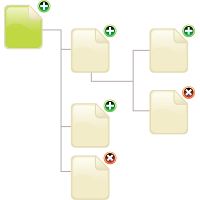 Planning to make money online? What is the right option for you: a website or a blog? Do you need a content management system (CMS) or static HTML website? What will help you make the best use of the online medium to make money?
Planning to make money online? What is the right option for you: a website or a blog? Do you need a content management system (CMS) or static HTML website? What will help you make the best use of the online medium to make money?
Website vs Blog: A website is more of a formal platform for one-way broadcasting. Generally, it will not have a comment system. In contrast, a blog serves as a two-way communication channel, thanks to comments. Blogs are more of a personal or informal communication channel. Technically, a blog is also a website. So search engines like Google and Yahoo will call both websites as blogs as websites. (Though, they have a separate search option for viewing results from blogs only.)
If you are planning a website for a local company, you should use static HTML for creating the website. If the company needs to add regular updates about, say, daily offers, you can add a blog to their website in a subfolder.
In contrast, if you are planning a website about latest video games where others can also add their comments, you need a blog. For this, you need a blogging platform such as WordPress (self-hosted WordPress.org). You can easily install WordPress in a couple of minutes.
Static HTML or CMS? Both websites and blogs may require to be updated frequently. However, the same may not be true for small websites. For example, if you are planning to have a website on “Nikon CoolPix Camera”, you don’t need to update it very frequently. All the webpages will be created in the beginning and new pages is unlikely to be more than a couple of articles per month. So, for small websites, all that you need it a static HTML website. You can use HTML templates or create your own using webpage HTML editors such as FrontPage, KompoZer and Nvu. Once you have created a website locally, you can transfer it to your web hosting using FTP applications such as FileZilla.
If you need to have a huge website where several people will be adding content daily, you will need a content management system or CMS which will do away with the need to create webpages manually. CMS Web applications such as Joomla, Drupal and WordPress allow you to have multiple users work on a website without having to manually create pages and update links and pages. CMSes automate the process and makes it easier for everyone. However, you also need database for CMS-based websites.
WordPress or Joomla: Though WordPress is primarily for creating blogs, a lot of people use it to build websites as it is one of the easiest CMS. It is very intuitive. Joomla and Drupal offer a lot more features, but the learning curve is steep. If you are planning a really big website with a big staff, you can use Joomla or Drupal, but you will need too train your staff.
 Structure of Blogs and Websites: Both websites and blogs are common in terms of planning and organization required. How may sections will you have? How many subsections? Based on the structure, you create webpages and upload them in the designated folders. In blogs, these sections and subsections are done with the help of categories and tags. Websites based on CMS will also have to be planned and structured in the dashboard of the application. When you are using static HTML for creating websites, you will have to manually create folders and subfolders for various categories/sections and upload the webpages in the designated folders.
Structure of Blogs and Websites: Both websites and blogs are common in terms of planning and organization required. How may sections will you have? How many subsections? Based on the structure, you create webpages and upload them in the designated folders. In blogs, these sections and subsections are done with the help of categories and tags. Websites based on CMS will also have to be planned and structured in the dashboard of the application. When you are using static HTML for creating websites, you will have to manually create folders and subfolders for various categories/sections and upload the webpages in the designated folders.
